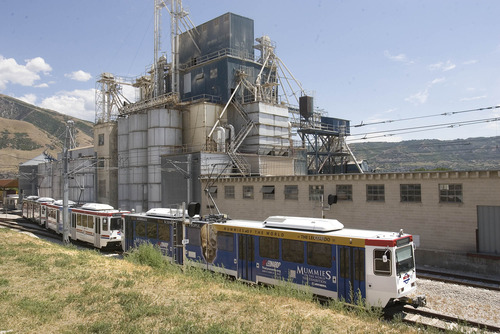This is an archived article that was published on sltrib.com in 2014, and information in the article may be outdated. It is provided only for personal research purposes and may not be reprinted.
As Salt Lake City Mayor Ralph Becker works to focus his administration on the most serious problem facing his community — air quality — the folks who operate the Utah Transit Authority are both his best friends and his worst enemies.
Friends, because moving more people out of their dirty cars and into comparatively cleaner buses and trains is one of the two most significant things that can be done to reduce the amount of gunk that lives in our air, and moves into our lungs, during the times of the year when geography and meteorology conspire to trap pollutants in our valley.
(The other one would be to accelerate new federal standards for cleaner fuels and higher-mileage cars. But that is a move that is clearly beyond the city's reach.)
Enemies, because the widespread perception that UTA is operated more for the benefit and convenience of its top administrators than it is for its ridership and the general public — a serious political drag on the necessary expansion of mass transit services in the valley.
That perception can only be exacerbated by the recent move of the UTA board to twist itself into odd shapes in order to justify awarding the agency's top brass some large salary bonuses, even though the performance targets that were supposed to trigger those awards were not quite reached.
The affection UTA board members show toward borrowing that particular private-sector gimmick is disquieting. When an operation that so many working-class people depend on to get to their low-paying jobs cooks up compensation packages for top administrators that top $300,000 a year, it is hard not to feel that something is out of alignment.
And the argument that UTA would somehow come apart at the seams if any of its top dogs were lured away by larger salaries elsewhere just doesn't hold water. Not in the public sector any more than it does in private business, where interlocking crony-filled boards of directors fill the pockets of managers at the expense of employees and stockholders.
It cannot be proven that there is a direct cause-and-effect relationship. But the agency's spendthrift image cannot have helped when the UTA, Salt Lake City and other municipal governments tried, and failed, to convince the Utah Legislature to authorize cities to ask their voters for permission to increase the local-option sales taxes that will have to be raised to cover the costs of increasing the coverage, frequency and overall quality of the metropolitan area's bus system.
The UTA practice of awarding such big bonuses, even as it cuts services, raises fares and seeks to increase taxes, doesn't just stick in the taxpayers' craw. It poisons their lungs.



